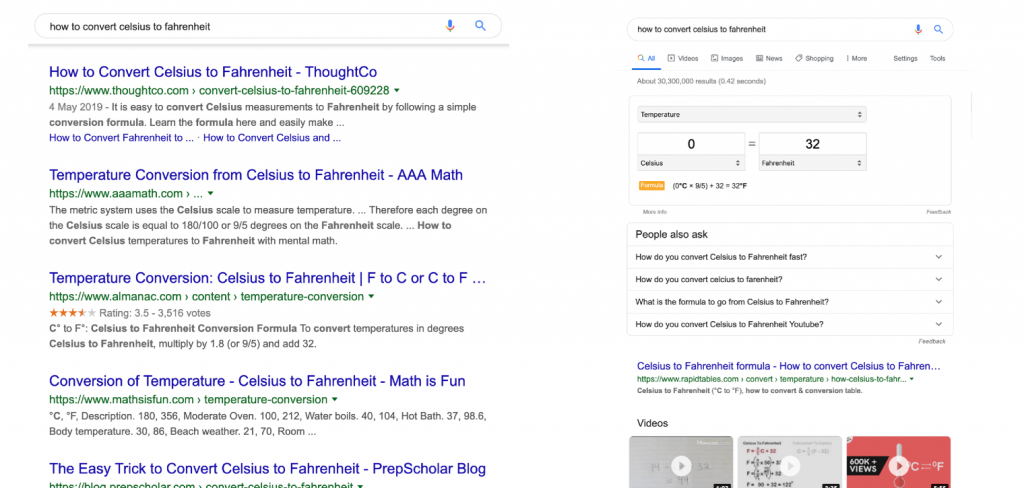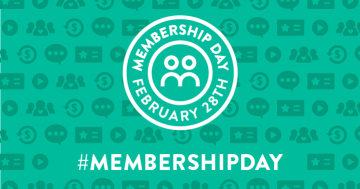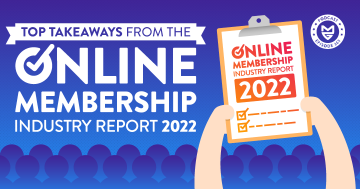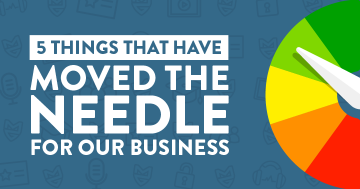What’s happening in the world of online memberships?
Is now a good time to have a membership site? And, what does the future of the membership industry look like?
Knowing the state of the membership industry is a great way to help you prepare months or even years in advance.
Thankfully, you don’t need a crystal ball to predict any of this because we’ve done all the hard work for you.
We’re about to reveal six key shifts that we see happening in the membership industry and how you can prepare for these challenges so that you’re in a position to be ready for anything.
Implications from the way the membership industry is growing
Online memberships are a fairly small market in the grand scheme of things, but membership awareness is growing steadily.
In fact, it’s higher than ever before with more content, podcasts, videos, blogs and services being aimed at membership site owners.
Now is a very good time to get into memberships because consumer trends are shifting and as we move into a sharing economy, people are valuing access over ownership.
However, there are six main challenges from the way the membership industry is growing to consider:
1) Increased Competition in the Membership Space
One of the most significant signs of growth in the online membership world is the number of ‘big players’ entering the market.
Facebook is just one example of a large corporation that started trialling the ability for group owners to charge for access.
On top of that, they introduced subscription payment options in their creator tools, allowing influencers to charge a monthly fee for access to their premium content on Facebook.

Paid Facebook Groups are still in beta testing, but they're coming…
Facebook isn’t the only social media network jumping on the membership bandwagon.
LinkedIn bought Lynda.com, an e-learning membership site while other companies including NBC, Fender and Master Class are also leveraging memberships.
It’s clear that all of these big players are moving into the online membership space for a reason and that reason is recurring revenue.
It’s appealing to businesses because of its reliability, stability and predictability.
After all, it costs five to seven times more to get a new customer than retain an existing one.
But don’t let all of these big players intimidate you.
Not all of them are destined to succeed in the world of online memberships.
Many have had and will continue to have false starts. Remember Amazon's Subscription Marketplace?
Lowering the barrier to entry
By introducing subscription tools to their platform – companies like YouTube, Facebook and Patreon are making it easier for people to start an online membership business.
This is good and bad news for you and me.
On the bright side, it’s providing a lot of opportunities while on the other hand, it’s forcing us to face a lot more competition!
Not to mention how this might influence pricing. Facebook have already announced they'll be capping subscription prices on their platform at $30 per month.
So if your membership is priced higher than this and other ‘big player’ averages, people could start viewing your membership as overpriced.
However at the same time, they're also normalizing the concept of online memberships.
With so much free content roaming the internet, a common and frustrating question many membership site owners are faced with is the classic – why should I pay to join your membership when there's so much free content already available?
Those sort of attitudes will shift as more and more big players enter the membership industry.
2) The Threat of Subscription Fatigue
Perhaps one of the biggest threats to membership owners is the rise of something called “subscription fatigue.”
We’re in the middle of a subscription boom right now and the industry has grown more than 300% over the past seven years.
With so many subscription services on the market, people are getting fed up.
They’re subscribing to a range of different service providers and companies until finally, they realize that they’re paying quite a hefty subscription bill each month.
Online memberships are just a small part of the subscription world.
Beyond memberships there’s subscriptions for streaming services, gaming, music, books, skincare products, pet boxes and many more.
With so many subscriptions and memberships, people are starting to feel overwhelmed with not only choice but with the amount of cash paying subscription bills every month.
A study carried out back in 2017 revealed that Brits waste £448 million on unused subscriptions a month!
When subscription fatigue strikes, people get ruthless.
So, how can you make sure that your membership makes the cut?
It’s simple. Whether or not your members cut you out of their monthly expenses depends on whether they see your membership as essential or expendable.

To be viewed as essential to your members, you must prioritize these three things:
Deliver ongoing value
If you want your members to pay you on an ongoing basis, you need to deliver value on an ongoing basis!
They must be aware of the role your membership plays in their progress towards reaching their goal.
Make sure that you let both your existing and potential members know about the perks, benefits and achievements they’re getting by being a member of your membership site.
Deliver an exceptional, remarkable and memorable member experience
You must deliver an exceptional member experience.
Think outside the box and don’t be afraid to create an emotional and/or personal connection between you and your members.
Make the experience as fun and engaging as possible.
That way, when your members evaluate their expenses, they’re far less likely to cut you out because they value the member experience so much.
Provide something that is truly irreplaceable to your members
Your members need to associate your membership as something in their life that they can’t live without.
To do this, you need to negotiate special deals and discounts on your tools, products or services so that your members save some money on things that they are already paying for anyway.
You could also provide an exclusive tool, product or software to existing members that nobody outside of the membership can access.
3) Increased Regulation for Subscription Businesses
Regulation isn’t the most glamourous topic in the world, but it is important.
Things like Digital VAT and GDPR can be a complete nightmare but it’s a necessary nightmare with good intentions.
GDPR is great because it tackles things like spam and pesky email marketing ploys that we never agreed to.
Plus, it basically forced big businesses to treat customer data and privacy more seriously than ever before.
So, if regulation is a good thing, why have we included it as a challenge on this list?
Well, it’s likely that we’re going to see a lot more regulations directly impacting the subscription business in the future.
The state of California has already passed a set of laws specifically targeting online subscription companies.
These laws force companies to be a lot more transparent about things like free trials, pricing and cancellation policies.
The UK isn’t far behind the sunny state and it won’t be long before we start to see more subscription-based laws announced by the government.
Yes, it’s going to take some time to make sure that your membership stays in the law’s good books.
But, these new regulations for subscription companies will prove to be a good thing for our industry.
It will help to weed out the dodgy membership sites that our industry has been plagued with in the past.
4) Search Marketing is Changing
In the past, SEO was your number one ticket onto the first page of search results.
However, SEO is evolving very quickly and traditional methods of getting your content found may not be as effective in the future.
Rand Fishkin, Founder of SparkToro, carried out intense research and studies on paid, organic and zero-click searches in Google.
His research found that less than half of Google searches result in a click.
This isn’t exactly ‘new news’ either. Zero-click searches have been on a steady rise for years and around 50.33% of Google searches end without a click.
So, what the heck is going on?
Where are searchers clicking on instead?
A lot of them are going to YouTube while others get the answer from Google itself.
If they ask a question, the answer often pops up towards the top of the page.
This means that you no longer need to search through different web pages to find your answer – Google does it for you.
Truth is, Google is no longer the place to receive recommendations of websites that may have the answer you’re looking for.
They are now the place that gives you the answer themselves and third-party links to other websites are being squeezed out.

Search engine result pages – old vs new
As a user, this new development is great. It makes life so much easier but it’s not exactly the best news for someone who is dependent on search traffic from Google.
Don’t worry though, you can adapt to these changes by doing the following things:
- Create specific content that answers your audience’s most pressing questions
- Consider expanding into other mediums such as blog articles, videos and podcasts
- Focus on ways to increase the average lifetime of your members
5) The Rise of Automation
Automation is really taking off and we’re seeing more chatbots and artificial intelligence being introduced to different areas of business and different industries.
However, we’re already starting to see the cracks appearing with new automation tools.
People are relying too heavily on automation for customer service.
They’re throwing real human interactions out the window and replacing them with robotic responses that just aren’t cutting it.
When you turn customer service into a click button exercise, you sacrifice customer service, and giving your members the human interaction they want when they signed up for your membership.
People crave human interaction.
So, even the smallest personal touch can have a massive impact on how your members view your membership.
Some great ways to achieve this is with things like personal videos, welcome packs, handwritten cards and so on.
Don’t make your members feel like they’re just another face in the crowd.
Human connection is becoming so rare that if you break away from the masses of memberships who depend on robotic responses and provide a real human connection, it will help yours to really stand out.
6) Erosion of Trust
Trust is harder than ever to capture and once lost, it’s almost impossible to earn it back without a lot of hard work, time and effort.
It’s not enough to be able to get someone to join your membership. You’ve got to keep them there and to do that, you need to earn their trust.
You need to market like a farmer, not a hunter.
In other words, think about your membership in the long-term and how you can build trust over time.
Trust isn’t a quick win for anyone, you really have to earn it.
By building a body work via content marketing that demonstrates your credibility, through which potential members will see that you’re an expert in your field and that you won’t scam them out of their money.
You need to prove that you’re offering them real value and in doing so, you’ll help to build their trust in you.
Your members must trust that you are going to help solve their problems.
After all, that’s why they’ve joined your membership: they’ve got a problem and you’ve got the solution.
Some other ways that you can build trust is by being transparent and offering things like money-back guarantees, behind-the-scenes content and most importantly, social proof.
Showcase things like reviews, case studies and testimonials so that people will see how you’ve helped others and impacted their lives.
Recap
Those are the key shifts that we see happening in the membership industry:
- The online membership industry is one which is undergoing a period of growth and is potentially on the cusp of that growth exponentially increasing.
- Big brands making inroads into the membership world is part of the overall explosion in the subscription market.
- This is bringing about the rise of subscription fatigue so now more important than ever to focus on delivering exceptional member experience and creating an emotional connection
- Industry growth invites increased regulation which, while often tedious, will change things for the better
- At the same time, memberships are needing to market smarter: for those relying on search it's important to understand that Google have changed, you need to change with them and market more efficiently if you rely on traffic from search.
- Automation is playing a larger part in business, but people are getting carried away. This gives you an opportunity to rehumanise member relationships at a time where personal connection is becoming a rarity.
- And with each passing day we see a continued erosion of trust in the world – especially online. To get ahead, membership owners need to invest in building trust and strengthening relationships at every stage: both before and beyond the sale.
Hopefully now you’re in a position to prepare for the challenges ahead!





